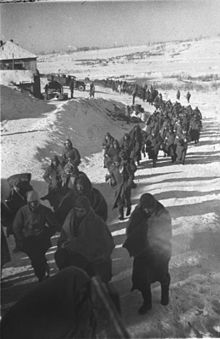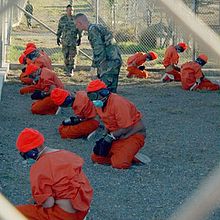Prisoner
![]()
The title of this article is ambiguous. See also: The Prisoner (disambiguation).
![]()
This article or section is still missing important information. Help Wikipedia by researching and adding it.
A prisoner is a person who is legally restricted in his or her liberties or illegally deprived of them, i.e. who is involuntarily held in captivity - in the custody of the state or of criminals.
- Deprivation of liberty (sovereign power) can have different reasons and forms. The best known is detention in a prison, penitentiary or in custody on the basis of a judgement or order, but also on the basis of a measure taken by the police. In addition, there is also open detention (e.g. semi-detention, daily detention), which in electronic monitoring represents a transition to serving a sovereign sanction without deprivation of liberty.
- Victims of deprivation of liberty, such as kidnapping or hostage-taking, are also prisoners.
One distinguishes in the legal system as legitimate captures
- prisoners serving a custodial sentence following conviction for a criminal offence
- Prisoners in preventive detention
- the detention pending trial
- for the preparation of extradition or deportation of detainees abroad
- Prisoners of war held in captivity under the international law of war
- and anyone deprived of their liberty as a result of the exercise of executive power.
Prisoners who are imprisoned for political reasons are referred to as political prisoners. Another special form is the detention of mentally ill offenders in (mostly closed) sanatoria and nursing homes, such as preventive deprivation of liberty in Switzerland, and placement in Austria.

Column of German prisoners near Stalingrad (February 1943)

Detainees at Camp X-Ray in Guantánamo (2002)
.jpg)
Prisoner in convict clothes and with ankle chains (Tasmania around 1900)
Germany
For the prisoner, the deprivation of liberty has a significant impact on his fundamental civil rights; from the imprisonment there is a restriction of the same. Tangential restrictions on fundamental rights include:
- the secrecy of correspondence (Art. 10 GG)
- freedom of expression without censorship (Art. 5 GG)
- freedom of movement (Article 11 GG)
- Prisoner work, duty of the prisoner to work, (explicitly mentioned for Germany in Art. 12 para. 3 GG and § 41 StVollzG; in Austria § 44 para. 1 österr. StVG and §§ 44ff; in Switzerland Art. 82 sStGB)
- Marriage and divorce in Austria: (§ 100, § 99 öStVG), contact with children
Other aspects are the dress code (wearing of private clothes or uniform institutional clothing), leisure time activities and others.
International regulations governing the rights, duties and other living conditions of prisoners:
- European rules on prison
- Geneva Conventions
- Hague Land Warfare Convention
A detainer (juvenile) is also a prisoner, but only for a short time.
See also
- Forced Labor
- Bahía de Guantánamo (Cuba)
- Jailbreak
- Prisoner release
- incarceration rate
Search within the encyclopedia